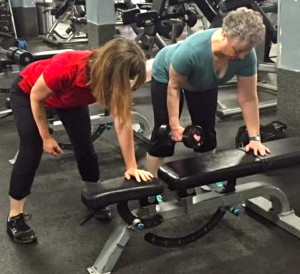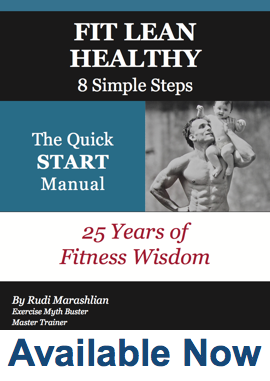
Exercise Physiologist or Personal Trainer – What is the Difference?
Chatting with La Crescenta and Los Angeles exercise physiologist and personal trainer, Rudi Marashlian about the various titles given to fitness professionals and what they mean for you. The whole subject of fitness can be confusing and then there all the different titles given to fitness pros – hopefully this article will help sort things out so at least you’ll know the difference between a fitness instructor, a personal trainer and an exercise physiologist. Rudi has over 30 years professional fitness experience and has dedicated his life and career to helping people understand fitness so he’s in a good position to help clarify things a bit.
Tracey: There are various titles that get thrown around like, “I’m a personal trainer”, “I’m a fitness instructor”. But you’re actually an exercise physiologist. What does that mean exactly? What is an exercise physiologist and how is that different from a personal trainer?
Rudi Marashlian: Okay, so you and I are both certified with the American College of Sports Medicine, which is leading edge. There’re over 400 certifying bodies in the USA – you can go and get your degree or associate degree, master’s, whatever you like in anatomy, physiology, biology, whatever, but if you’re going be a trainer, then you need to also get a certificate of some kind.
And it’s not a license. It’s not illegal not to have a certificate in the USA. But if you’re going work in gyms and you’re trying to work with an ethical code – there’re guidelines – then you need to get with a certifying body. We picked the American College of Sports Medicine. It’s full of PhD research, it’s the leading edge, tends to be quite a bit medical. They have different titles for different groups of people – whether you want to work in a hospital environment or out with sports people in gyms, et cetera, so they have different grades.
With my fitness experience and degree in exercise science, I am deemed an exercise physiologist, which just basically means I have a good theoretical background of a university nature specific to exercise science. And I have a lot of practical fitness experience as well.
Only people with a university degree in something related to exercise qualify to certify as an exercise physiologist. It’s a higher level than a personal trainer and exercise physiologists are able to work with people who are considered higher risk when it comes to exercise – they might have diabetes, high blood pressure, spine problems and so on.
What is the Real Deal on Fitness Professionals?
Here is a summary of the main certification and qualification titles that are used for fitness professionals, starting with the highest level (in terms of educational and experiential requirements) and going down to the most basic and easily-achieved certification.
Athletic Trainer
Athletic trainers are the highest-qualified fitness professionals. They collaborate with physicians and have many skills that provide injury prevention, emergency care, diagnosis and rehab of injuries. Athletic trainers must graduate a specialized Bachelor’s or Master’s degree program and often work with professional athletes to ensure they remain injury-free and competitively active.
Exercise Physiologist
Exercise physiologists are trained to analyze their clients and patients and create programs to help athletes reduce incidence of injuries and also recover faster when they occur. They are qualified to work with people who have serious disease and are recovering from medical procedures to regain their health.
An exercise physiologist is a health care professional who has completed a degree in exercise science or a related subject and who has additionally been certified to practice in this field. You’ll find them designing sports equipment, in universities, working with professional athletes and, if you are lucky, working with regular people in a gym setting.
Personal Trainer
A personal trainer should be someone who is qualified to design exercise programs for most healthy people and help them perform the movements in a safe and effective way. The title of personal trainer is not at all standardized, as are exercise physiologists and athletic trainers, and this can lead to confusion as to what their scope of practice includes.
The most reputable personal trainers are certified with the top 4 certifying agencies (ACSM, NASM, NSCA and ACE) and are continually enhancing their knowledge and skills base by participating in accredited continuing education.
Fitness Instructor
A fitness instructor leads group exercise classes – yoga, spin, aerobics and so on. The official certifications are less demanding than that of a personal trainer who is responsible for correct programming of individuals based on a detailed health and fitness screen. The best fitness instructors have a fun-loving personality, are good at motivating people and enjoy exercise. Fitness instructors generally do not work one-on-one with clients.
Go Fit Now Personal Trainers – Only the Highest Quality
Go Fit Now boasts ACSM Exercise Physiologist, Rudi Marashlian and ACSM Certified Personal Trainer, Tracey Marashlian, both of whom take continuing education classes with organizations such as NASM, ACSM, NSCA, Pierce College and Perform Better.
Contact us to find out more about our successful personal training and corporate wellness programs.



